Have you ever thought of raising chickens? What about ducks? If given the choice, which would you raise?
Both birds come with their advantages and they are both easy to raise. What are the pros and cons of chickens and ducks? Can you raise both birds together?
Which is easier to raise, chickens or ducks? The answer depends on several factors.
Ducks are easier to raise than chickens. Ducks are hardier and need less care than chickens. However, chickens are more popular, so chicken feeds and supplies are more readily available.
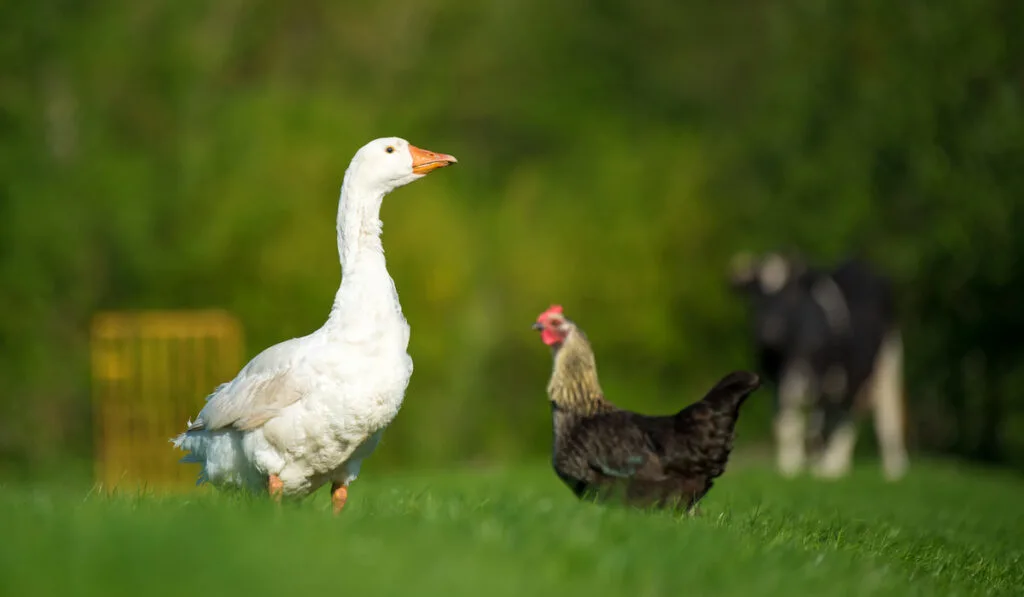
What should you consider when raising chickens or ducks? Which species provides more meat or eggs? What are their feed requirements? Read on to find out.
Table of Contents
Which Should You Raise, Chickens or Ducks?
Before you decide which bird you should raise, you have to consider the pros and cons of each. You also have to know why you want to raise birds in the first place.
Most people raise chickens and ducks for meat or eggs. Others raise their birds as pets. Your reason will determine what bird you should raise.
Pros and Cons of Raising One Over the Other
Does raising chickens have cons? What advantages do ducks offer over chickens? It is time to find out.
Pros of Raising Chickens
Some pros of raising chickens are:
- Most people prefer chicken meat to duck meat.
- You can use chickens to control pests on other animals.
- If you need a natural alarm clock, raise roosters (male chickens).
- Feed formulated for the different ages of chickens is readily available.
- Chickens are more popular, so there are more guide books to help you.
Cons of Raising Chickens
Anything with pros has cons:
- Chickens lay fewer eggs during winter.
- Chickens (especially roosters) can be loud.
- Most chicken breeds are not as hardy as most duck breeds.
- They can dig through and damage the roots of your garden plants if they free range.
Pros of Raising Ducks
Some pros of raising ducks are:
- Ducks produce larger eggs.
- Most duck breeds are hardy.
- Ducks are not loud like chickens.
- Most duck breeds will continue to lay abundant eggs during winter.
- They do not scratch or damage the roots of garden plants when free-ranging.
Cons of Raising Ducks
Does raising ducks have any cons? Let us find out:
- Ducks usually play in and make a mess of their water.
- Even though they will not scratch the roots of your garden plants, ducks can trample on plants with their large webbed feet.
- You may not always find formulated duck-specific feed, so you may have to substitute chicken feed.
Now that you know some pros and cons of raising chickens or ducks, it is time to discuss the best birds to raise for meat, eggs, or as pets.
Raising Birds for Eggs
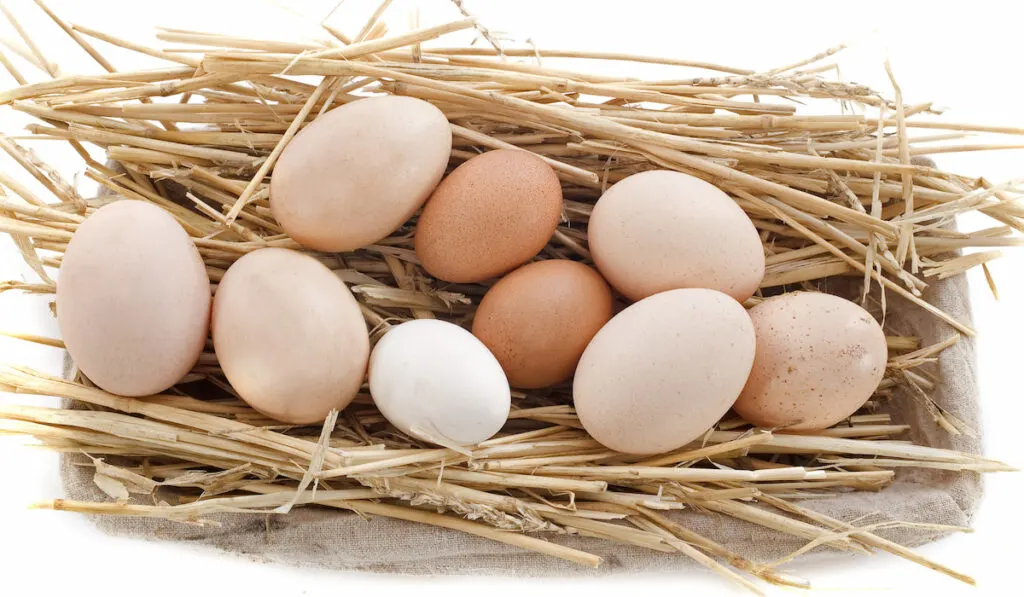
When it comes to laying eggs, chickens and ducks have differences. In egg size, duck eggs are larger than chicken eggs. Generally, two duck eggs equal three chicken eggs in size.
The total number of eggs that mature ducks lay is not too far from that of chickens.
Chickens start laying eggs when they are four or five months old, while ducks reach six or seven months before they start laying eggs.
Considering everything above, you can conclude that you should raise ducks if you want larger eggs, and raise chickens if you want eggs more quickly.
In the winter, ducks will continue to lay eggs more regularly without extra measures. However, if you want your chickens to continue laying eggs, you have to provide an extra source of heat and light in the coop.
Some recommended egg-laying chicken breeds are:
- Red Star: 300 eggs per year
- ISA Brown: 300 eggs per year
- Australorp: 250-360 eggs per year
- Rhode Island Red: 300 eggs per year
- White Leghorn: 285-325 eggs per year
- New Hampshire Red: 300 eggs per year
- Speckled Sussex: 200-300 eggs per year
- Golden Comet: 250-300 eggs per year
- Barred Rock Plymouth: 200-280 eggs per year
Some recommended egg-laying duck breeds are:
- Buffs: 150-225 eggs per year
- Pekin: 200-250 eggs per year
- Magpie: 250-300 eggs per year
- Muscovy: 180-200 eggs per year
- Indian Runner: 300-315 eggs per year
- Khaki Campbell: 250-300 eggs per year
- Silver Appleyard: 200-265 eggs per year
Raising Birds for Meat
According to the breed, most chickens are ready to be butchered as meat in 4-6 months (some, as early as 2 months). Ducks, however, do not grow as fast as chickens (5-7 months).
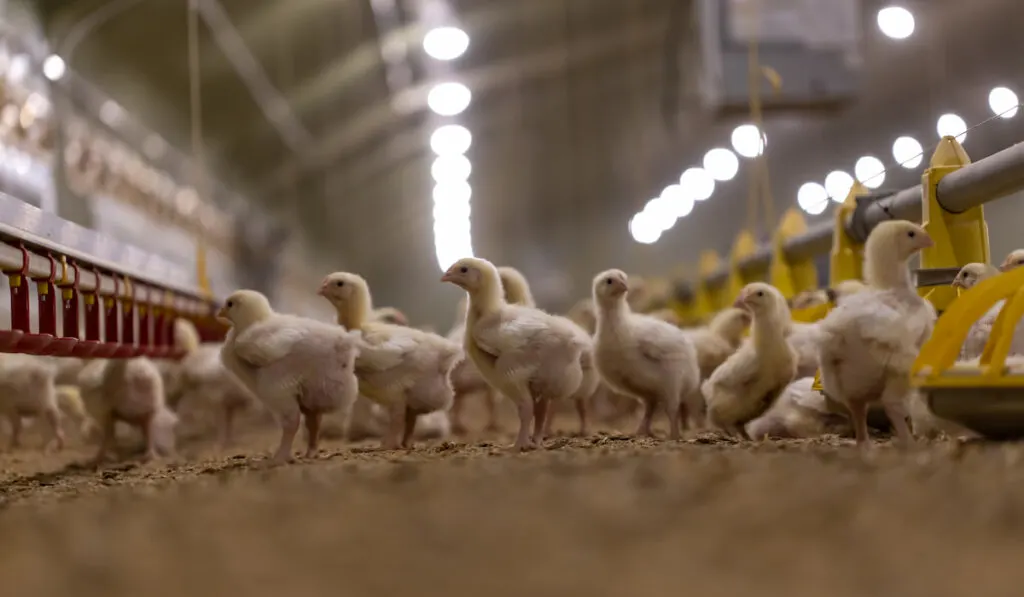
Some chicken breeds that are great for meat production are:
- Bresse: 7 lbs in 16-20 weeks
- Buckeye: 9 lbs in 16-21 weeks
- Orpington: 10 lbs in 18-24 weeks
- Cornish Cross: 12 lbs in 4-6 weeks
- Jersey Giant: 13 lbs in 16-21 weeks
- Brown Leghorn: 6 lbs in 16-21 weeks
- Freedom rangers: 6 lbs in 9-11 weeks
- New Hampshire Red: 8.5 lbs in 8-10 weeks
Some recommended duck breeds for meat production are:
- Aylesbury: 5 lbs in 7-9 weeks
- Rouen: 7-9 lbs in 12-16 weeks
- Muscovy: 5-7 lbs in 16-18 weeks
- Swedish Blue: 7-8 lbs in 16-20 weeks
- Jumbo Pekin: 10-11 lbs in 12-15 weeks
Raising Chickens and Ducks as Pets
It is easy and fun to keep chickens or ducks as pets. Both birds make great pets, but ducks make better emotional support animals. Some pet ducks will even cuddle up to or neck-hug their keepers.
Before you decide to have chickens or (especially) ducks as pets, remember that they poop a lot. There are diapers you can purchase for your birds if you take them in public. However, be aware that not all places accept chicken or duck pets.
Now you know which type of poultry is best for the reasons of meat, eggs, or pets. You can use the table below as a quick reminder:
| Reason for Raising Bird | Recommended Bird |
| As pet | Ducks |
| More eggs | Chickens |
| Large eggs | Ducks |
| Winter hardy | Ducks |
| Quick production of meat | Chickens |
| Raising guides and feed always available | Chickens |
What if you do not want to choose one, but instead, you want to raise both? Is it possible to raise chickens and ducks together? Continue reading to find out.
Raising Chickens and Ducks Together
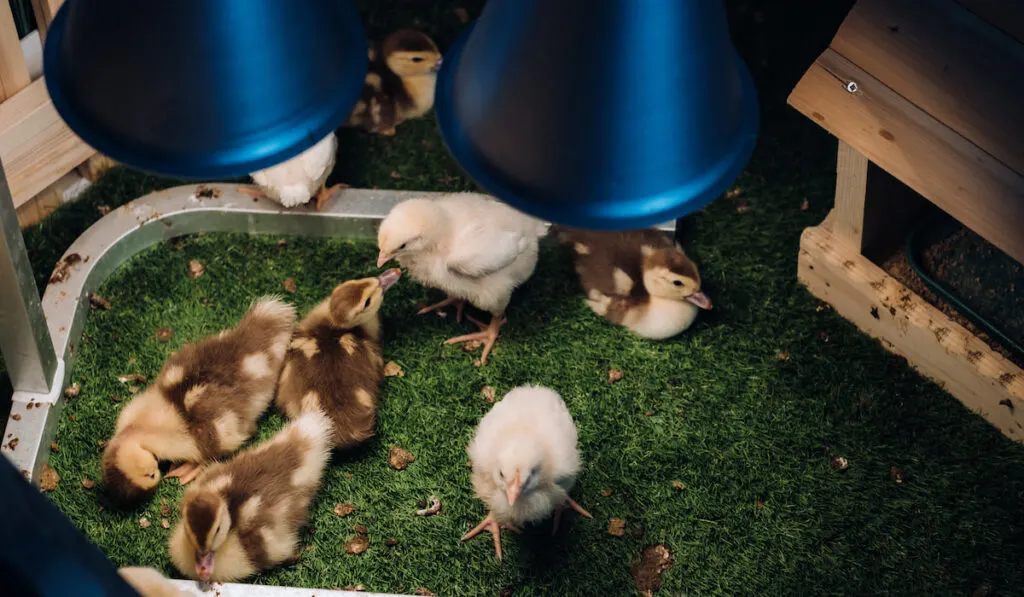
It is not only possible, but it is also safe to raise chickens and ducks in the same coop or run.
Ducks do not compete with chickens for off-the-ground roosting areas, and they can eat the same food.
There are, however, some differences that you should note.
Feed and Water Requirements
Chickens and ducks can eat the same kind of feed. You should give your birds a formulated feed that matches their age. Aside from processed feed, your birds will happily eat:
- Fruits
- Insects
- Cereals
- Mealworms
- Earthworms
Both birds are omnivores, so remember to vary their diet so it consists of both animal and plant-sourced ingredients.
Ducks need more water than chickens and they love to dip their heads and necks in water.
In fact, ducks love to play with water, so you should provide water in a large container (such as a plastic swimming pool or bathing tub) that they can swim in.
Housing and Care Requirements
A normal chicken coop is enough for both chickens and ducks. You can use straw, hay, or any material of your choice as the coop bedding.
During winter, make sure that there are no drafts in the coop. It is a good idea to provide an extra heat source as the temperature drops below freezing, and to properly insulate the coop.
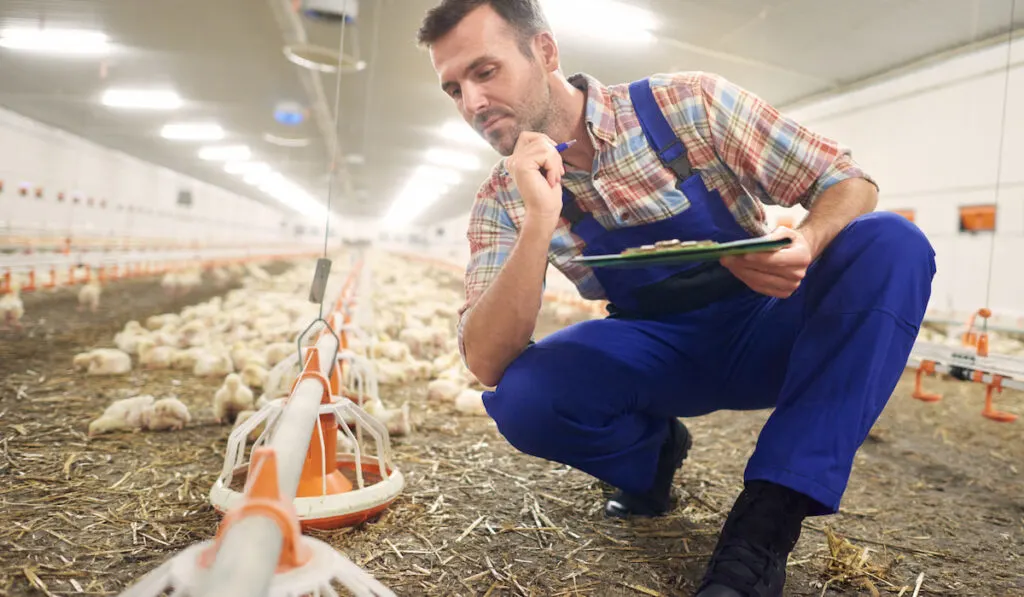
Give your birds cereals or feeds with corn in the evening during the winter months. Digesting the corn helps keep them warm at night. You can also hang vegetables such as cabbages in the coop to keep the birds busy.
Always remember to clear out the old bedding when it becomes full of manure. Heavily soiled bedding can harbor disease organisms that could infect the whole flock.
Chicken and Duck Diseases
Some common duck and chicken diseases are:
- Poultry Lice: A wingless parasitic insect that infects birds.
- Salmonellosis: The bacterium Salmonella enterica infects a wide range of hosts including chickens and ducks.
- Fowl Typhoid: A contagious disease caused by the bacterium Salmonella gallinarum.
- Coccidiosis: A very common poultry disease caused by organisms in the subclass Coccidia.
- Erysipelas: A disease affecting birds that is caused by the bacterium Erysipelothrix insidiosa.
If a bird shows any signs of disease, contact a vet immediately and isolate the bird so that the disease does not spread.
Now you know how to raise chickens and ducks. You also know some common diseases shared by chickens and ducks. Take good care of and enjoy your birds.
Final Thoughts
Both chickens and ducks are easy to raise. The bird you choose should depend on your reason for raising them. Ducks do not grow quickly like chickens but produce larger eggs. Chickens are easier to get, so many people choose chickens. Both birds are fun and rewarding to raise.
Will you choose to raise chickens or ducks? Can you raise both? Share your thoughts in the comment section below.
Sources
- http://extension.msstate.edu/agriculture/livestock/poultry/diseases-poultry
- https://www.kellogggarden.com/blog/animals/the-difference-in-raising-a-duck-vs-chicken/
- https://www.chelseagreen.com/2019/ducks-vs-chickens/
- https://www.thehappychickencoop.com/raising-ducks-vs-chickens/
- https://familyfarmlivestock.com/16-duck-breeds-for-eggs-and-meat/
- https://www.knowyourchickens.com/meat-chickens/

samantha Kneen
Friday 4th of March 2022
Wich is better with dogs
April Lee
Sunday 10th of April 2022
Its usually the dogs that are the problem, not the ducks or chickens. It's essential that dogs that are around livestock be well socialized with them and supervised at all times until they have proven themselves to be livestock safe.